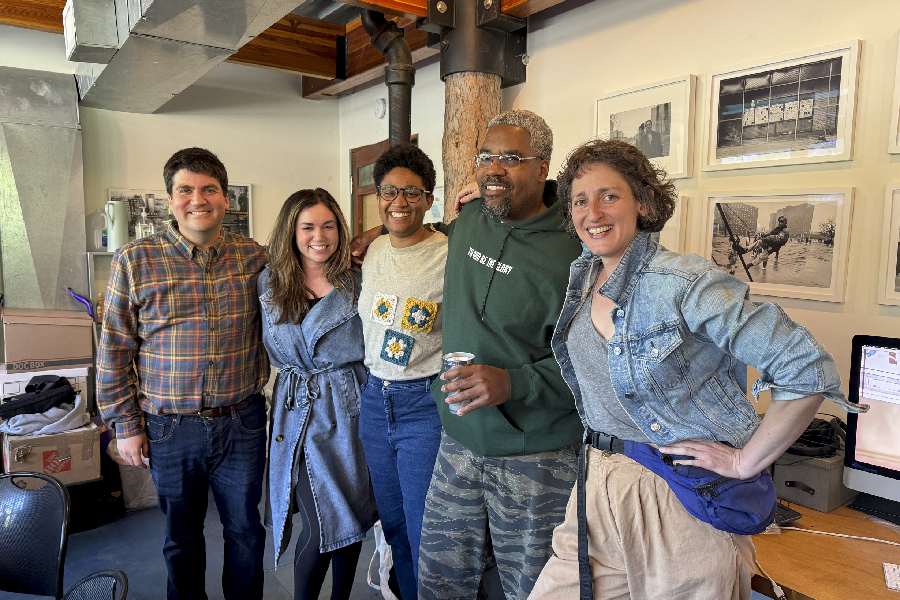When Jamie Kalven met Yohance Lacour in 2017, the two men quickly realized they had something important in common.
Kalven, founder of the Invisible Institute, a nonprofit Chicago newsroom, was working in Chicago’s Stateway Gardens housing development in 1997 when a vicious hate crime deeply wounded the community there. And Lacour helped a local newspaper cover that story at the time.
With Kalven’s help, Lacour’s recollection of that period — and the story of his eventual incarceration on a drug conspiracy charge — became the subject of an 11-episode podcast, “You Didn’t See Nothin,” which Monday won the Pulitzer Prize for audio reporting.
Lacour’s podcast won one of two Pulitzers this year for the Invisible Institute, a small, crusading newsroom on Chicago’s South Side known for holding city authorities to account. The other prize, for local reporting, went to the organization’s data director, Trina Reynolds-Tyler, who reported an investigative series on missing Black girls and women in Chicago.
The awards made the Invisible Institute the biggest surprise of Monday’s Pulitzer Prize announcements, an annual celebration of the news industry’s best work.
“It’s stunning,” Kalven, 75, said in an interview. “I just stepped out of our office, which is in a complete uproar of excitement.”
The Invisible Institute, which employs roughly a dozen journalists, is known for teaming up with other newsrooms to publish its investigations. Lacour’s podcast was created in partnership with USG Audio, a division of Universal Studio Group. Reynolds-Tyler shared her Pulitzer with Sarah Conway of City Bureau, a nonprofit newsroom in Chicago.
Incorporated in 2015, the Invisible Institute focuses on high-impact journalism examining issues of race, housing and criminal justice. It is known for its investigations into local police, including the 2014 murder of 17-year-old Laquan McDonald by a Chicago police officer, and its fight for government transparency; Kalven won a landmark 2014 case that resulted in the disclosure of records of police misconduct.
This isn’t the first time the Invisible Institute has won a Pulitzer. A yearlong investigation into police K-9 units with AL.com, the Marshall Project and IndyStar received the prize for national reporting in 2021.
Lacour, who served most of a 10-year sentence, had been a writer for his entire life and wanted to pursue that professionally when he got out of prison. Before he met Kalven, he was considering asking his neighborhood newspaper if he could do anything, including editing classified advertisements. His father guided him toward Kalven, one of his neighbors.
The pair quickly realized that the 1997 attack on Lenard Clark, a Black teenager who was accosted in a white neighborhood, was an enormously important story that merited revisiting. While many of the facts of the case were known, the full context — including how it affected South Side residents — was largely unexamined.
So Lacour began the painstaking process of trying to track down people familiar with the hate crime decades after the fact. It took years — long enough that Lacour offered to return a $3,000 stipend he had received for a yearlong fellowship, since his work hadn’t been published when it ended. But Kalven told him to keep digging — “It takes as long as it takes,” he said — and eventually they decided to tell the story on a podcast.
“I think this is the perfect medium to tell this story,” Lacour recalled Kalven saying. “And I think that I can see where your personal story should be baked into it.”
In 2023, about six years after Kalven’s first conversation with Lacour, the podcast debuted. It shed fresh light on Clark’s attack, drew listeners from around the globe and won a slew of awards, culminating Monday with the Pulitzer.
Lacour, 50, said the prize was an emotional one for him, in part because it recognized the retelling of such a personal story.
“It’s overwhelming,” Lacour said. “It’s literally like your dream come true in a lot of ways.”
The New York Times News Service











